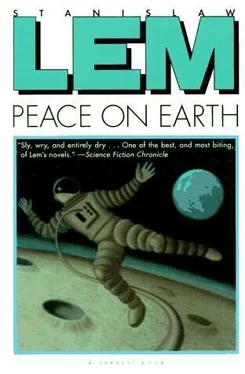Everyone understood that the peace depended on the monitoring, so the question was how to make the monitoring untouchable. An insoluble problem, it seemed, a regressus ad infinitum: One could devise a system to monitor a monitoring system, but that system itself would be vulnerable to attack, so one would have to monitor the monitor of the monitor, and so on, without end. But this dilemma was solved quite simply. They encircled the moon with two surveillance belts. The inner belt guarded the sectors; the outer belt guarded the inner belt. And the trick was: both would be independent of Earth. Thus the arms race could continue on the moon in total secrecy from all countries and all governments. The weapons would evolve, but the surveillance of them would remain unchanged for a hundred years. The whole thing, really, was quite absurd. An unknown arsenal was useless in politics. They should have simply disarmed without bringing the moon into it, but there was no mention of that possibility. Everyone knew where talk of disarmament led: nowhere. In any case, when the idea of demilitarizing Earth and militarizing the moon was accepted, it was clear that sooner or later an attempt would be made to violate the doctrine of ignorance. The newspapers from time to time ran stories under screaming headlines about surveillance machines that vanished upon detecting something; some said they were intercepted by satellites and captured. And governments accused each other of sending probes, but it was impossible to tell their origin because an electronic device is not a person: you can’t get anything out of it if it’s made properly. But then these anonymous scouts, these space spies, stopped appearing. And the human race sighed with relief, especially because of the economics, the fact that the moon weapons didn’t cost a cent now. The energy was furnished by the sun, the raw materials by the moon. Which should also help limit the evolution of weapons, because there are no lodes of metal on the moon.
The generals had expressed the concern that weapons adapted to lunar conditions might not work on Earth. I couldn’t recall how the gravity was increased, though they must have explained that to me at the LA. Tarantoga and I were flying BOAC. The night outside the windows was Stygian, and I thought, amused, that I had no idea where we were going. Should I ask Tarantoga? On the other hand, perhaps it would be better if we were to part company. In this awful situation, perhaps I should be silent and fend for myself. A good thing It couldn’t read my thoughts. As if I carried an enemy in my head, though of course it was no enemy.
The reason the Lunar Agency, a supranational organization set up by the UN, turned to me? Its double-guard system had worked too well. We knew that the borders between the sectors had not been disturbed, but that was all we knew. In certain nervous, imaginative minds rose the specter of an attack upon Earth by the nonliving forces of the moon. The military sectors’ inability to exchange information might be only temporary. The sectors might learn to communicate through ground tremors, seismically, making the vibrations in the rock look like natural moon-quakes. The self-engineered and self-improving weapons might all join and one day unleash their monstrous power against Earth. Why should they want to do this? How would it benefit a nonliving army to reduce Earth to ashes? It wouldn’t, of course, but cancer, everpresent in the organisms of higher animals and human beings, is an inevitable albeit disadvantageous consequence of evolution. People began to talk and write about this lunar cancer, and there were seminars, articles, novels, and films on the subject, and the fear of atomic annihilation, which had been dispelled on Earth, returned in a new form. The surveillance system included seismographs, and certain scientists reported that the frequency of tremors in the moon’s crust was increasing, and seismic readings were analyzed for hidden codes, and fear grew. To calm the public, the Lunar Agency said in communiques that the odds of this happening were one in two hundred million, but no one believed that calculation. The fear finally reached the politicians, and they began to demand periodic inspection of the sectors and not just of their borders. The Agency spokesmen explained that any such inspection could not rule out the possibility of espionage to learn the current state of the lunar arsenals. After long meetings and complex negotiation the LA finally received authorization to reconnoiter.
Reconnaissance, it turned out, wasn’t so easy. None of the probes returned. Not a peep from them by radio. Specially armored landers were sent, with television cameras. The observation satellite showed that they indeed landed, and exactly on target, in the Mare Imbrium, in the Mare Frigoris, in the Mare Nectaris, and in the no man’s land between the sectors. But not one of them sent back a picture. As if the ground of the moon had swallowed them. Understandably, this caused panic. A state of emergency. The papers urged that the moon be preemptively bombed with hydrogen bombs just to play it safe. But that couldn’t happen unless a missile was built and atomic warheads again manufactured. Out of this fear and confusion my mission was born.
We were flying above thick clouds, their mounds tinged with pink from the morning sun still hidden below the horizon. Why, I wondered, did I remember the terrestrial things so well, while remembering so little of what happened on the moon? I knew some reasons. It wasn’t for nothing that I’d read all those medical books when I got back. There are two kinds of memory, temporary and permanent. Severing the great commissure does not affect what the brain has already accumulated, but fresh memories evaporate, do not become permanent. What evaporates particularly is what the patient experienced shortly before the operation. Therefore I didn’t remember most of what happened to me those seven weeks on the moon, when I went from sector to sector. All that remained in my head was an aura of strangeness, nothing I could put into words, into a report. Strangeness, and yet it was not threatening, or so it seemed to me. No dark conspiracy against Earth. I felt certain of that. But could I swear that what I felt and knew was the whole story? Perhaps It knew more.
Tarantoga was silent, only glancing at me from time to time. As usual on eastward flights, with the Pacific beneath us, the calendar tripped and dropped a day. BOAC was belt-tightening, apparently, because all we got to eat was chicken salad. We landed in Miami. It was early in the afternoon. Customs dogs sniffed our suitcases. We stepped out into the heat. Melbourne had been much cooler. A rental car was waiting for us; Tarantoga must have ordered it in Melbourne. We put our luggage in the trunk and set off down a highway full of traffic, and still said nothing, because I had asked the professor not to tell me our destination. Overcaution, perhaps, but I would stick to that policy until a better one suggested itself. And he didn’t need to say anything, because after more than two hours on back roads we arrived at a large white building surrounded by pavilions, palms, and cacti, and I knew at once that my trusted friend had brought me to an insane asylum. Not a bad place to hide, I thought. In the car, I had looked over my shoulder now and then to see if we were being followed, but it never entered my head that I was such an important, valuable person that they would follow me by a method less conventional, not found in any spy novel. From a modern satellite not only can a car be observed but wooden matches counted on a garden table. That never entered my head — more precisely the half of my head that could understand without sign language the mess Ijon Tichy had got himself into.
Читать дальше












